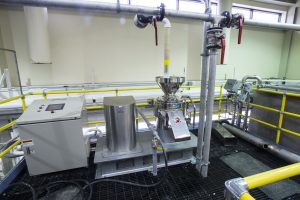UMaine Nanomaterial Pilot Plant
Opened in 2012, the UMaine Nanomaterial Pilot Plant is a cutting-edge addition to the Process Development Center (PDC) at Jenness Hall. The pilot plant was funded through a joint venture with the USDA Forest Service and is the only one of its kind in the country. Constructed in parallel to the Cellulose Nanocrystal Pilot Plant at the Forest Products Lab (FPL) in Madison, Wisconsin, the plant provides samples of biobased nanomaterials for application development.
At the PDC, the grant funded the purchase of an ultrafine grinder, a spray dryer, and a major upgrade of our stock preparation and refining capacity. This state-of-the-art equipment enables the PDC’s pilot plant to produce cellulose nanofibrils at a rate of one ton per day (the Process Development Center is the only facility that can manufacture CNF at this scale in the United States).
The purpose of the facility and the program is to
- Provide researchers with working quantities of a wide range of forest-based nanomaterials
- Develop scalable methods to convert wood components into high-performance nanomaterials
- Improve methods to isolate and characterize the various forms of nanocellulose
- Develop standards for various grades of nanocellulose
- Support emerging markets for products made from wood-derived renewable nanomaterials
- Provide a fee-for-service facility that clients can use to advance their own research and development projects
Pilot Plant Capabilities
- Ultrafine Grinder – The Masuko MKZB15-50J super mass colloider creates a high shear zone that helps to liberate nanofibers present in natural lignocellulosic fibers. The final product is a slurry of about 3 wt% cellulose nanofibers that can then be further processed.
- Upgraded Refiner Laboratory – The stock preparation and refining pilot plant at the PDC includes high-efficiency pumps, piping, and agitators in order to handle the large volume and viscosity of the cellulose nanofiber slurry produced in the plant.
- Spray Dryer – The GEA Process Engineering VSD-6.3-P Spray Dryer produces dry nanofibers. This is particularly useful for applications that cannot utilize a water-based slurry or in cases where the product needs to be stored for long periods of time. The dryer has the ability to dry several pounds of nanocellulose per day. The dryer also allows for chemical modification of the material, which helps impart additional functionality.
Equipment
- 100 gal. Black Clawson repulper
- 2000 gal. GL&V repulper
- 13” disc refiner – inline or recirculating; variable speed drive
- 20” disc refiner – inline or recirculating; variable speed drive with anti-clash unit
- Masuko pilot scale and benchtop super mass colloider
- GEA spray dryer
- Centrisorter
- Various centricleaner systems
- PFI mill
- 1,000 gal. machine chest
- 1,000 gal. blend chest
- (2) 1,500 gal. stock chests
- (2) 3,000 gal. stock chests


